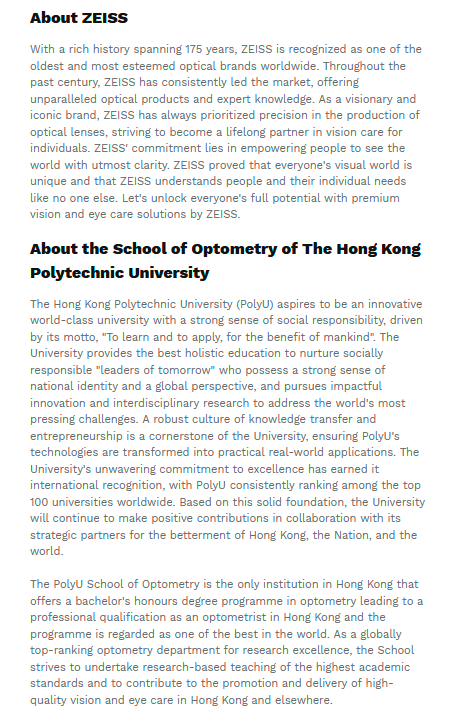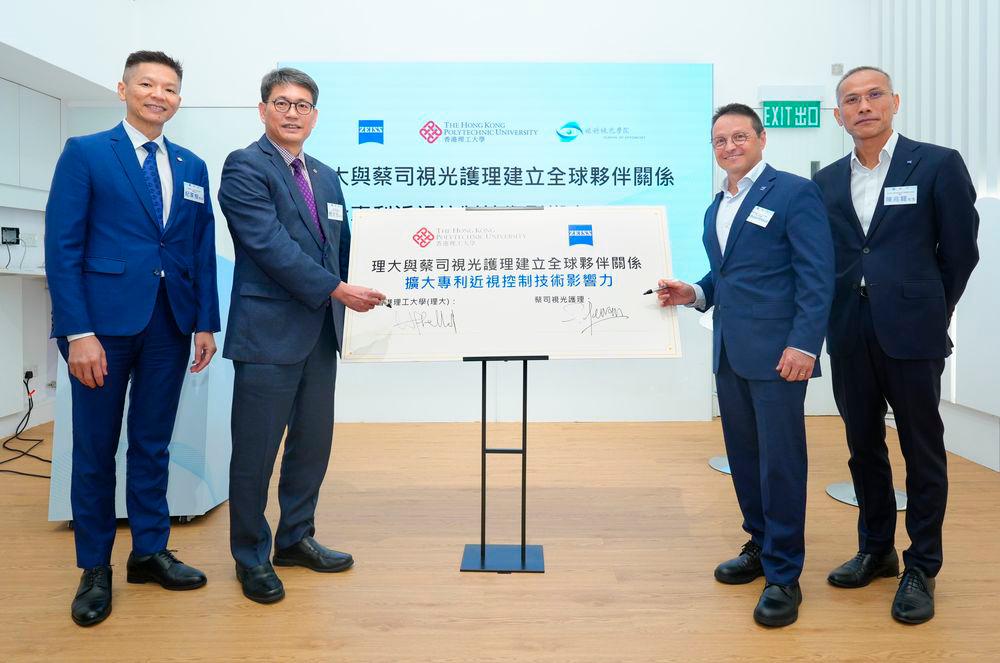HONG KONG SAR - 30 July 2024 - ZEISS Vision Care (ZEISS) and the School of Optometry of The Hong Kong Polytechnic University (PolyU) announced their latest collaborative initiative, ZEISS MyoCare Myopia Control Spectacle Lenses (ZEISS MyoCare Lenses). The lenses utilize PolyU’s patented Defocus Incorporated Soft Contact (DISC) technology for myopia management. Through this collaboration, the two parties joined forces to drive better control and management of myopia in children globally. This collaboration has enabled ZEISS to adopt PolyU’s patented DISC technology in its specialist optical products, integrating authoritative academic ophthalmic research with cutting-edge ophthalmological technology to provide the public with new effective professional vision care solutions.
ZEISS MyoCare Lenses uses PolyU’s DISC technology[1], its patented design adds a set of specialized optical microstructures to the general refractive myopia correction optical structure. The two sets of optical structures are arranged alternately on the lens surface. The corrective area projects the image onto the retina, allowing the wearer to see a clear image, while the optical microstructures project another set of images in front of the retina, i.e., the “forward optical defocus” signal, utilizing the eye’s natural emmetropization feedback mechanism to guide the eye and slow down the growth of the eyeball axis of myopic patients. The technology is completely non-invasive and has undergone multiple basic experiments and clinical verifications, proven to be safe, effective and without significant side effects.
ZEISS MyoCare Lenses also incorporate patented ZEISS C.A.R.E.® technology. It can effectively decelerate the rate of myopia progression by 48% to 63% and diminish axial length increase by 41% to 77%[2],[3]. Furthermore, these lenses provide wearers with clear vision regardless of viewing distance and direction, and are easy to adapt to, with over 95% of child wearers able to adapt to the lenses within three days[4],[5].
A recent 12-month research report shows that nearly 90% of children wearing ZEISS MyoCare Lenses experienced slow annual myopia progression, compared to 51% of children wearing single vision lenses experiencing fast progression[6]. Moreover, ZEISS MyoCare lenses slowed eye growth from that of a myopic eye to approach that of an emmetropic eye by nearly 70%[7].
Mitigating the Risk of Myopia Progression in Children with Parental Myopia
Research confirmed that genetic factors, such as having parents with myopia, increases a child’s risk of developing myopia. However, a 12-month clinical study has shown that compared to wearing regular single vision lenses, using ZEISS MyoCare Lenses can effectively slow down myopia progression, even for children with myopic parents, who are especially at risk of developing myopia[8]. This indicates that these lenses can help parents with myopia reduce the increased risk of myopia development in their children, essentially breaking the cycle of worsening myopia each generation.
Professor Christopher Chao, Vice President (Research and Innovation) of The Hong Kong Polytechnic University, said, “PolyU has always been committed to promoting technology transfer. The DISC technology for myopia management is an excellent example to demonstrate how academic research can be transformed into effective industry solutions, offering an additional option in the market for those in need. It is a great pleasure to collaborate with ZEISS, a leading optical brand, to jointly strive for excellence in the development of myopia control for the benefit of community.”
David Ferran, Head of LatAm, Iberia & Asia-C, Vision Care Business, ZEISS Group, added, “ZEISS has been working closely with PolyU for many years. Through this collaboration, we will jointly develop more innovative technologies, aiming to bring the best ophthalmological technology into vision correction solutions, collectively addressing the threat posed by myopia and promoting the well-being of children worldwide.”
Calvin Kwan, President of The Hong Kong Optometric Association, said: “Myopia is a serious issue among Hong Kong children, and age six to 12 years old is the ‘golden period’ for myopia control. Parents should seize the opportunity to provide the best and most effective myopia control measures for their children, safeguarding their eye health and preventing the development of high myopia and other long-term eye health problems.”
The Trusted Choice for Parents – Backed by Scientific Research
Parents’ testimonials: “In this digital age, it is practically impossible to completely avoid exposing our children to electronic devices, especially with the widespread adoption of e-learning in schools. As parents, we want to provide the best protection for our children, ensuring they have healthy eyes to see the future more clearly and far. Aligned with the needs of the current era, the issue of myopia control in children is a key eye health concern that parents need to address.”
Parents’ selection criteria: “When it comes to selecting lenses for myopia control, the primary consideration is the effectiveness and whether it is supported by scientific research. Since the ‘golden period’ for children’s myopia control is only about six years, if we are unable to select and use scientifically proven products in a timely manner, the effect of slowing down myopia progression will be greatly diminished, and the precious golden period from age six to 12 will be missed.
The ZEISS MyoCare Lenses are supported by real data, which not only gives me confidence in the product, but also allows me, through this myopia control solution, to work more closely with the optometrist to address my child’s myopia progression. I believe parents play a very important role in protecting the eye health of their children.”
[1] Hong Kong Polytechnic University owns granted patents (including Chinese patent: CN103097940) on annular concentric lens for myopia control, which are licensed to Carl Zeiss..
[2] Compared to ZEISS single vision lenses, after 12 months of wear, ZEISS MyoCare designs slowed myopia progression on average of 48% (MyoCare) and 45%(MyoCare S) for spherical equivalent error, and by 41%(MyoCare) and 34%(MyoCare S) for axial length. Chen, X., et al. (2024, May 5-9). Slowing myopia progression with cylindrical annular refractive elements (CARE) – 12-month interim results from a 2-year prospective multi-center trial [Conference presentation abstract]. The Association for Research in Vision and Ophthalmology (ARVO) Annual Meeting, Seattle, WA, United States.
[3] Compared to ZEISS single vision lenses, after 6 months of wear, ZEISS MyoCare slowed myopia progression on average of 0.15D (63%) for spherical equivalent error and 0.07mm (77%) for axial length. Alvarez-Peregrina, C., et al. (2024, May 5-9). Efficacy of a next-generation design of ophthalmic lenses for myopia control: Six-month results of the CEME Study [Conference presentation abstract]. The Association for Research in Vision and Ophthalmology (ARVO) Annual Meeting, Seattle, WA, United States.
[4] Rifai, K., et al. (2024, May 5-9). Subjective acceptance of spectacle lenses with cylindrical annular refractive elements (CARE) in Chinese children with myopia [Conference presentation abstract]. The Association for Research in Vision and Ophthalmology (ARVO) Annual Meeting, Seattle, WA, United States.
[5] Alvarez-Peregrina C., et al. (2024, April 12-14). Vision, confort y tiempo de adaptacion a un nuevo diseno de lente oftalmica para el control de miopia [Conference presentation abstract]. OPTOM 2024, Madrid, Spain.
[6] Sankaridurg, P., et al. (2024, May 5-9). Probability of surviving fast progression and eye growth reversal after 1-year of spectacle wear with cylindrical annular refractive elements [Conference presentation abstract]. The Association for Research in Vision and Ophthalmology (ARVO) Annual Meeting, Seattle, WA, United States.
[7] Twelve-months of lens wear, both ZEISS MyoCare lenses slowed AL significantly and approached closer to AL growth of an emmetropic eye, with average EPRs of 70%* for ZEISS MyoCare and 68% for ZEISS MyoCare S. Ohlendorf, A., et al. (2024, May 5-9). Myopia control efficacy through Emmetropic Progression Ratio:1-year of spectacle wear with cylindrical annular refractive elements (CARE) [Conference presentation abstract]. The Association for Research in Vision and Ophthalmology (ARVO) Annual Meeting, Seattle, WA, United States.
[8] Boeck-Maier, C., et al. (2024, May 5-9). Impact of parental myopia on myopia control efficacy of spectacle lenses with cylindrical annular refractive elements (CARE) [Conference presentation abstract]. The Association for Research in Vision and Ophthalmology (ARVO) Annual Meeting, Seattle, WA, United States.
The issuer is solely responsible for the content of this announcement.










